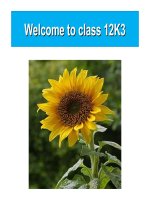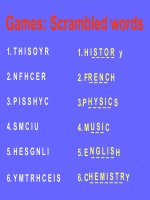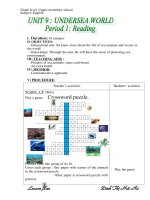E10-U11 Reading
Bạn đang xem bản rút gọn của tài liệu. Xem và tải ngay bản đầy đủ của tài liệu tại đây (246.89 KB, 7 trang )
Unit 11: NATIONAL PARKS
A. READING
Class: English Education 02 – C33
Period: Thursday Morning
Friday Morning
Group 4
Group Members
1. Lý Thị Ánh Tuyết - 7075918
2. Võ Thị Tuyết Hồng - 7075890
3. Lê Thị Bích Thuỳ - 7075907
4. Ung Ngọc Nhã Phương - 7075903
5. Võ Trần Bảo Thư - 7075909
6. Nguyễn Ngọc Thảo Nhung - 7075901
7. Huỳnh Thị Thanh Trúc - 7075915
8. Trịnh Hồng Tính - 7075911
Stage Activity
Timin
g
Content
Teacher’s
Activities
Student’s
Activities
Work
Arrangem
ent
A.
PRE-
REA
DING
Open
prediction
-Teaching
vocabular
y
10
mins
Task: Look at the
pictures and guess what
there are in the national
parks.
Presenting Vocabulary:
1. tropical (adj)
2. rainforest (n)
3. temperate (adj)
4. orphan (n, v)
orphanage (n)
5. toxic (adj)
6. wild(adj)
wilderness
-Put three
pictures on the
board and get
students to read
out the names of
three national
parks
- Ask students to
work in pairs
and guess what
they can see in
national parks in
one minute
- Get students to
speak out things
they can see in
national parks
and write down
in the board
- Ask students
“Do you know
where these
national parks
are located?”
- Check the
students’
guesses and
their answer by
starting the
lesson
- Use techniques
to present
vocabulary:
1. situation +
translation
2. picture +
explanation
- Read out names
of national parks
from the pictures
-Work in pairs and
discuss what they
can see in national
parks
- Speak out things
they can see in
national parks
(trees, animals,
grass, caves,…)
-Answer the
teacher’ question
_ Answer eliciting
questions to get
vocabulary
-Whole
class
-Pair work
-Whole
class
_Whole
class
_Whole
class
B.
WHIL
E
READ
ING
1. Fill in
the
blanks
10mins
(n)
Task 1: The words
in the box below all
appear in the reading
passage. Use them to
complete the following
sentences.
3. picture +
explanation +
translation
4. picture +
situation +
translation
5. picture +
explanation
6. picture +
explanation +
translation
- Give students
the model of
pronunciation
-Get students to
repeat the
vocabulary, then
elicit the
meanings, part
of speech and
the stresses
-Rub out new
words and get
students to
repeat from their
memory
- Read out the
words in the box
and get student
to repeat
- Ask students to
read the reading
passage and
underline the
words from the
- Listen and repeat
- Follow teacher’s
instructions
- Repeat
vocabulary from
their memory
-Listen and repeat
- Read the passage
and underline the
words
_Whole
class
_Whole
class
_Whole
class
_Whole
class
- Individual
sub-tropical establish
survival species
contamination contain
2.
Multiple-
choice
10mins
1. People __________
national parks to protect
endangered animals and
plants.
2. Tourists can go to
Nairobi national park to
study various ________of
orphaned animals.
3. Water pollution
threatens the __________
of many animals in
Everglades National Park.
4. People can visit
different kinds of national
parks such as rainforests,
temperate forests and
__________ forests.
5. Many toxic chemicals
in the water cause the
__________ in
Everglades National Park.
6. Most of national
parks __________ lots
of rare animals.
Task 2: Read the
passage again and then
circle the best answer
A, B, C or D to
complete the following
sentences.
1. The main idea of this
reading passage is about
_______________.
a. the location of
national parks
b. the contamination of
national parks
c. the general
box occurring in
the passage in 3
minutes
- Elicit the part
of speech of
words in the box
from the
students
-Check
instructions
- Get students to
work in pairs to
fill in the blanks
in 5 minutes
- Ask students to
go to the board
and fill in the
blanks
-Give students
the correction
and feedback
-Give students
hand-out of
Task 2
- Ask students to
read the reading
passage again
- Get students
individually to
circle one best
- Give the part of
speech of words in
the box based on
the reading passage
-Answer the
questions
- Work in pairs to
fill in the blanks
- Go to the board
and fill in the
blanks
- Follow the
teacher
-Get the hand-out
from teacher
- Read the passage
again
- Choose one best
answer for each
sentence
_Whole
class
-Whole
class
- Pair work
- Individual
_Whole
class
- Individual
- Individual
information of national
parks
d. the species of plants
and animals in national
parks
2. Cuc Phuong National
Park is a __________
a. temperate forest with
a lot of rain
b. temperate forest
without rain
c. tropical forest with a
lot of rain
d. tropical forest without
rain
3. The best time to visit
Cuc Phuong National
Park can be in
__________
a. February
b. May
c. June
d. September
4. Visitors can go to
Nairobi National Park to
__________
a. see the 1000-year-old
tree
b. see the dependence
among species for living
c. see the independence
among species for living
d. see the toxic levels of
chemicals in the water
5. In Nairobi National
Park, people can
specially see lots of
________
a. animals without
parents
b. animals having
parents
answer for each
sentence
- Ask students to
go to the board
and write their
answers
- Give
correction and
feedback
individually
- Go to the board
and write the
answers
- Follow the
teacher’s
instructions
- Individual
-Whole
class
C.
AFTE
R
READ
ING
Role play
15
mins
c. animals without
children
d. animals having
children
6. One of the reasons
causing the
contamination in
Everglades National
Park is the _________.
a. decrease in population
b. waste water from
factories
c. growth of population
d. overuse of technology
7. Everglades National
Park has animals and
plants from ________
zone.
a. neither tropical nor
temperate
b. only tropical
c. only temperate
d. not only tropical but
also temperate
Task: Work in pairs.
Student A takes the role
of a traveler who is
going to visit one of 3
national parks (Cuc
Phuong, Nairobi,
Everglade), but A
doesn’t have any
information of the
national park he wants
to visit. Student B takes
the role of a tour guide.
At the travel agency, A
asks B about:
The location of
national parks
Special features
-Give students
the instruction to
do the task
- Ask students to
work in pairs
- Provide
students the
roles ( one is the
traveler, the
other is the tour
guide)
- Give students
the cards
containing cues
they will use in
-Listen
- Follow the
teacher’s
instruction
-Get the cards from
the teacher
-Pair work
of national parks
Activities
travelers can do
in the national
parks.
their role- play
- Let students
work in pairs in
6 minutes
- Get one or two
pairs to perform
what they have
done in pairs
- Give feedback
-Remind
students of
reading the
passage again at
home and
learning
vocabulary
- Work in pairs
- Perform their
interviews in front
of class
- Listen
- Follow the
teacher’s
instruction
-Pair work
-Pair work
-Whole
class









